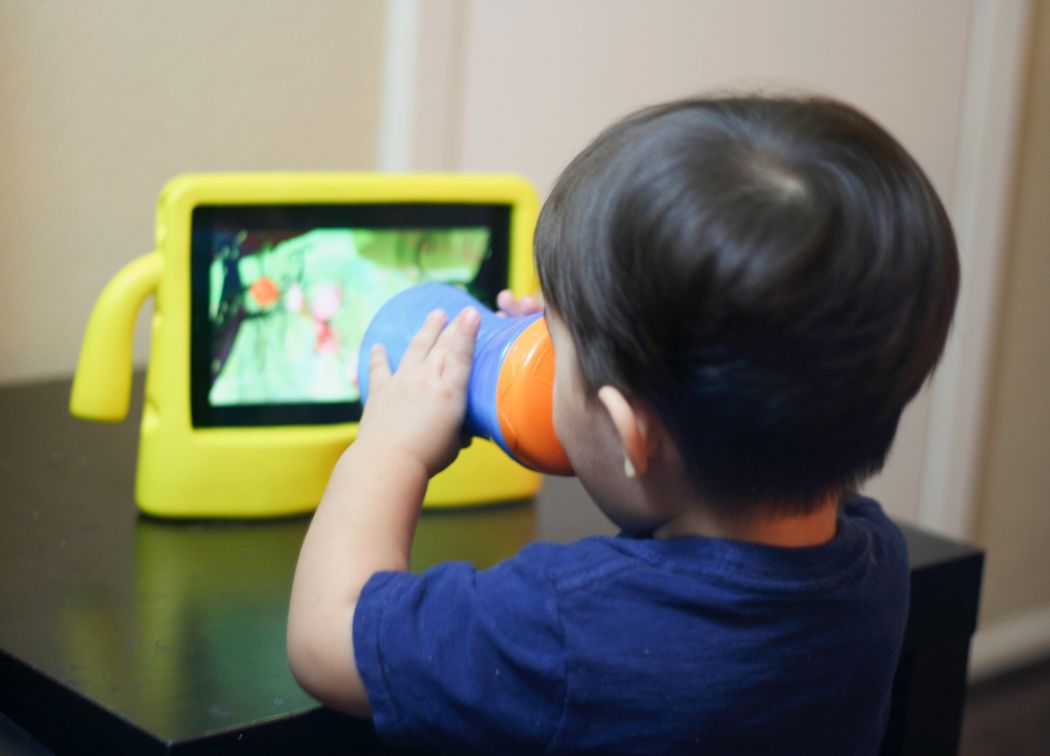Parenting brings a huge amount of difficulties, particularly when it comes to ‘screen time.’
As parents, we all care about your child’s success and well-being. However, in today’s digitally fueled world, keeping your kids disciplined is one heck of a job.
From 2-year-olds who don’t know how to speak to toddlers who don’t seem to understand right or wrong and teenagers who need freedom, they all have one thing in common.
They know what an iPad is!
It is surprising to see kids even before they can talk or walk, are able to operate an iPad or similar smart devices.
The 21st century is raising children with access to screens like never before. It is both boon and bane for the generation since technology can be manipulated either way.
Everyone is looking for answers on how to reduce their children’s screen time since it is taking a toll on their lifestyles.
In the age where they need to go outside, play physical games and activities, and make friends, they are glued to their video games, TVs, the internet, and phones.
So, to the question – “what do kids value?” one can say that they value ‘screen time.’
But as a parent, you must not see it as a defeat or there is no need to stress about it.
Technology is important, even for you and it will help your kids become capable of certain things, even help them decide their career choices.
You might think that reducing screen time with no tantrums or tears sounds far from achievable. The idea is to let your kids earn their screen time.
But, it is possible. How? By giving your children the structure to make good choices, where they feel they are in control and make better decisions.
With that being said, in this post, we will discuss how you can limit your child’s screen time without deliberately being harsh on them and whether it is possible to let your kids earn their screen time.
Let’s get started.

Some Screen Time Tips
The key to set screen time is the same as setting any parenting rules – establish limits, set a good example, offer rewards, and talk to your kids.
The following are some ways to make your child’s screen use more productive:
- Keep the computer in a common area where you can have eyes on what’s going on
- Use screening tools like screen time apps on smartphones, tablets, computers, and TV to block your kids’ access to inappropriate materials (more on this below)
- Create a chore chart for your kids where you can assign different chores at a specific time. Similar to school time tables, your kids have to follow the chore chart
- Spend screen time together to ensure that what your kid access is appropriate
- Treat screen time as a privilege that kids need to earn. Tell them that they are only allowed screen time after they complete the assigned chores
- Ensure that your kids have plenty of free-time activities
Best Chore Charts for earning screen time
Chores are a great way to teach children responsibility.
With a chore chart, you can limit your kids’ screen time as you can leverage chores to make them earn the screen time.
Here are some of the best chore charts available online:
Jennakate Child Behavior Reward Chore Chart
This is the best way to teach your child about self-sufficiency and responsibility. This chart includes a reward system.
If your kid completes the chore, he/she gets the screen time.
Yaze Magnet Whiteboard Chore Chart
It allows you to organize your kids’ household chores with ease. Your kids will learn the importance of chores after using this chore chart.
DasKid Magnetic Star Chore Chart
With this chore chart, you can rate your kids’ chore performance with stars. This is a great way to encourage your kids to take up responsibilities.
You should also learn these tips I have here on how to actually limit your kids’ screen time if you want to be successful in helping them learn by earning their screen time.
Best Apps to Let Kids Earn Screen Time
Screen time apps are a great way to control your children’s screen time. Here are some of the best apps you download:
Qustodio Parental Control
- Block inappropriate content
- Track your child’s location
- Monitor texts and call logs
- Set limits for or blocks the use of certain apps or content
FamiSafe
- Filter content on websites
- Track a child’s phone location
- Restrict specific apps
Boomerang Parental Control
- Track your child’s location
- Call block feature
- Manage internet searches and website access
Best practices to limit your child’s screen time
The challenge with the screen-based products is that if you restrict the use of one, your kid will shift over to another venue.
The thing is they will find anything to do rather than doing what you want them to do.
Moreover, using screen time as a consequence or a privilege can get tricky, especially when other members in the house have to use the internet.
This might cause you to run up against real issues.
For screen time, thus, to be a motivating incentive and an effective consequence, it needs to be restricted and offered wisely.
Some parents have found creative yet effective ways to monitor and restrict their kids’ screen time access in their households.
Necessity leads to invention and people have come up with some best practices that parents across the globe can implement to reduce the screen time without tears and tantrums.
Some of the most popular ways parents are controlling their children’s screen time include:
- Some parents have started taking the game controllers and cable box with them to work and plug them back only if the child has completed his/her homework or other tasks that were assigned to him/her. This is a great way to control your kids from video game addictions and binge-watching television content. The child knows that he/she doesn’t have any other option but to complete the given tasks else he/she won’t get time on the video game.
- Some parents have started changing their home’s Wi-Fi password on a daily basis. The kids are told to perform certain tasks and given responsibilities to take care of if they want access to the internet. These parents say that they have started seeing a tremendous change (positive) in the behavior of their kids, as they are acting more responsible now. This is one of the best ways to control screen time usage without a physical power struggle. The child is working to earn his/her screen time, which is a positive aspect.
- Some parents don’t allow their kids to watch television, use a smartphone, or play video games until after dinner. Those who did, experience positive results. For starters, the kids started engaging in creative projects, started spending more time outdoors, and started having real conversations with the parents.
The most interesting tactic that parents are using, which is actually working wonders for them, is the use of ‘Technology Tickets.’
In a book called Essentialism by Greg McKeown, there is a small nugget of wisdom that every parent must absorb.
In the book, the author has suggested parents hand out limited numbers of Technology Tickets to their kids at the beginning of the week.
The kids can turn the ticket when they want screen time. What’s interesting is that the kids could earn additional tickets if they read for 30 minutes.
And for every unused ticket, the kids can sell them to their parents for .50 each. Some parents tried this approach and it worked like a charm.
It not only reduced the screen time substantially but there were no more tears, whining, and tantrums. The kids started earning a dollar or two by the end of the week.
As you can see that all the examples we have mentioned here make the child work hard to earn their screen time.
These are some of the best ways and prove that you don’t have to snatch that iPad from your child’s hands or have to indulge in a physical power struggle.
You don’t have to scold them nor have to see them all teary-eyed and full of tantrums.
All you have to do is give instructions, set rules, and make them follow these rules and instructions by leveraging screentime as the prize.
What Experts Say
Leading pediatricians at the Royal College of Pediatrics and Child Health say that there is not enough evidence that confirms that screen time is harmful to the health of the child at any age.
Officer for Health Promotion for the RCPCH Dr. Max Davie says that you should “let parents be parents” and empower them to regulate the screen time spent by all family members based on their families’ requirements.
He says that rather than setting screen time limits for kids, parents should create screen time around family activities like sleeping, eating, playing, and socializing.
This will help in limiting household screen time.
RCPCH published a Screen Time Guidance report for parents that outline questions, which can help them make decisions about the use of screen time. Some questions include:
- Does screen time interfere with sleep?
- Does screen time interfere with what you as a family want to do?
- Are you able to control snacking during screen use?
Dr. Davie says that it is essential to encourage parents to do what they think is right for their family.
However, a parent must know where the grey area lies so that they are no harsh on their kids.
The American Academy of Pediatrics, on the other hand, has to say something else regarding the screen use.
They recommend parents of kids 5-18 years old to put consistent parameters on the use of any media.
This includes educational media on smartphone apps as well as entertainment media such as watching movies and TV.
They say that screen time is not created equal and it is up to parents how they want their kids to use screen time, and whether it is negative or positive.
For example, time spent educational activities like homework might not be considered as restricted time as time spent on watching movies or playing video games.
Final Words
It is up to the parents how they introduce technology to their kids. Keep things simple and don’t try to force things on your kids.
Leveraging the idea of rewards is a viable option that could do wonders for you.
If you want to take more control in what your kid sees, learn about these ways to set an appropriate internet filter for them.






